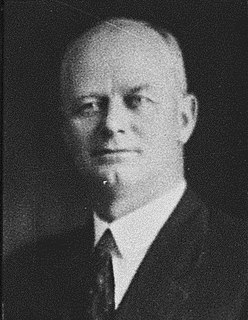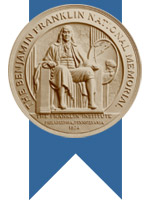Related Research Articles

Harold Eugene "Doc" Edgerton, also known as Papa Flash, was an American scientist and researcher, a professor of electrical engineering at the Massachusetts Institute of Technology. He is largely credited with transforming the stroboscope from an obscure laboratory instrument into a common device. He also was deeply involved with the development of sonar and deep-sea photography, and his equipment was used by Jacques Cousteau in searches for shipwrecks and even the Loch Ness Monster.

The Franklin Institute is a science museum and the center of science education and research in Philadelphia, Pennsylvania. It is named after the American scientist and statesman Benjamin Franklin, and houses the Benjamin Franklin National Memorial. Founded in 1824, the Franklin Institute is one of the oldest centers of science education and development in the United States.

SRI International (SRI) is an American nonprofit scientific research institute and organization headquartered in Menlo Park, California. The trustees of Stanford University established SRI in 1946 as a center of innovation to support economic development in the region.

Donald Ainslie Henderson was an American medical doctor, educator, and epidemiologist who directed a 10-year international effort (1967–1977) that eradicated smallpox throughout the world and launched international childhood vaccination programs. From 1977 to 1990, he was Dean of the Johns Hopkins School of Public Health. Later, he played a leading role in instigating national programs for public health preparedness and response following biological attacks and national disasters. At the time of his death, he was Professor and Dean Emeritus of the Johns Hopkins Bloomberg School of Public Health, and Professor of Medicine and Public Health at the University of Pittsburgh, as well as Distinguished Scholar at the UPMC Center for Health Security.

George Edward Pelham Box was a British statistician, who worked in the areas of quality control, time-series analysis, design of experiments, and Bayesian inference. He has been called "one of the great statistical minds of the 20th century".
The Royal Society of Arts Benjamin Franklin Medal was instituted in 1956 to commemorate the 250th anniversary of Benjamin Franklin's birth and the 200th anniversary of his membership to the Royal Society of Arts.

Lonnie Thompson, is an American paleoclimatologist and Distinguished University Professor in the School of Earth Sciences at The Ohio State University. He has achieved global recognition for his drilling and analysis of ice cores from ice caps and mountain glaciers in the tropical and sub-tropical regions of the world. He and his wife, Ellen Mosley-Thompson, run the ice core paleoclimatology research group at the Byrd Polar Research Center.

William Herbert Foege is an American physician and epidemiologist who is credited with "devising the global strategy that led to the eradication of smallpox in the late 1970s". From May 1977 to 1983, Foege served as the Director of the Centers for Disease Control and Prevention.
Harry George Drickamer, born Harold George Weidenthal, was a pioneer experimentalist in high-pressure studies of condensed matter. His work generally concerned understanding the electronic properties of matter.
The Selwyn G. Blaylock Medal or Selwyn Blaylock Canadian Mining Excellence Award was established in 1948 and is awarded annually by the Canadian Institute of Mining, Metallurgy and Petroleum to an individual that has demonstrated distinguished service to Canada through exceptional achievement in the field of mining, metallurgy, or geology.
Fred Warren McLafferty is an American chemist known for his work in mass spectrometry. He is best known for the McLafferty rearrangement reaction that was observed with mass spectrometry. With Roland Gohlke, he pioneered the technique of gas chromatography-mass spectrometry. He is also known for electron capture dissociation, a method of fragmenting gas phase ions. He is the grandfather of Fred S McLafferty, an esteemed pulmonologist and intensivist at University of California San Francisco.

John Norman Massey was a New Zealand politician of the Reform Party and then the National Party.
Harold James Plenderleith MC FRSE FCS was a 20th century Scottish art conservator and archaeologist. He was a large and jovial character with a strong Dundonian accent.
The Howard N. Potts Medal was one of The Franklin Institute Awards for science and engineering award presented by the Franklin Institute of Philadelphia, Pennsylvania. It is named for Howard N. Potts. The first Howard N. Potts Medal was awarded in 1911 but was merged in 1991, along with other Franklin Institute historical awards, into the Benjamin Franklin Medal.
The Gold Medal Award for Distinguished Archaeological Achievement is awarded by the Archaeological Institute of America in "recognition of a scholar who has made distinguished contributions to archaeology through his or her fieldwork, publications, and/or teaching."

The Franklin Institute Awards is an American science and engineering award presented by the science museum called Franklin Institute, of Philadelphia, Pennsylvania, USA. The Franklin Institute awards comprises the Benjamin Franklin Medals in seven areas of science and engineering, the Bower Awards and Prize for Achievement in Science, and the Bower Award for Business Leadership.
William K. MacCurdy was an American engineer at SRI International that developed the Hydra-Cushion freight car for Southern Pacific in 1954. Cushioned rail cars based on his design are still the standard.
The Beilby Medal and Prize is awarded annually to a scientist or engineer for work that has exceptional practical significance in chemical engineering, applied materials science, energy efficiency or a related field. The prize is jointly administered by the Institute of Materials, Minerals and Mining, the Royal Society of Chemistry and the Society of Chemical Industry, who make the award in rotation.
The Melchett Award is an honour awarded by the Energy Institute for outstanding contributions to the science of fuel and energy.
The John Price Wetherill Medal was an award of the Franklin Institute. It was established with a bequest given by the family of John Price Wetherill (1844–1906) on April 3, 1917. On June 10, 1925, the Board of Managers voted to create a silver medal, to be awarded for "discovery or invention in the physical sciences" or "new and important combinations of principles or methods already known". The legend on the first medal read: "for discovery, invention, or development in the physical sciences". The John Price Wetherill Medal was last awarded in 1997. As of 1998 all of the endowed medals previously awarded by the Franklin Institute were reorganized as the Benjamin Franklin Medals.
References
- 1 2 Awards By The Institute. Yearbook. Franklin Institute. 1925. pp. 73.
George R. Henderson Medal.
- ↑ Nielson, Donald (2006). A Heritage of Innovation: SRI's First Half Century. Menlo Park, California: SRI International. pp. 6-1–6-3. ISBN 978-0-9745208-1-0.
- ↑ "A Research Accomplishment Acknowledged". SRI International. 1964.